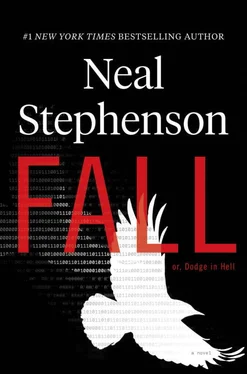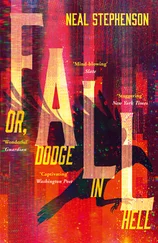The affected region—the spot where he was absolutely blind—was not black, as you might imagine. This could be proved simply by closing his eyes so that he actually was seeing just black. The blind spot then showed up as a region of vaguely defined yellow and black stripes, like the patterns painted on factory floors to limn danger zones, except that these flashed and fluctuated like an old-time television with its vertical hold out of whack.
Even as he drew these connections he was erecting defenses against a likely flanking attack from Polycultia, one of the Furious Muses, who was always pointing out that everything Richard could possibly think of was culturally relative. In this instance she might expect tactical support from Cerebra, an unintentionally offensive FM who had a knack for pointing out that any idea Richard came up with that he thought was clever was, in fact, but an imperfect rendering of a smarter idea that had occurred to her a long time ago. The projected line of attack from the Polycultia–Cerebra axis went something like this: Okay, because part of Richard’s visual cortex was on the blink, he was seeing “nothing” in that region. His brain was in the business of constructing, from moment to moment, the sort of three-dimensional model of the universe that, for example, enabled him to grab his phone from his bedside table without opening his eyes. As such, it couldn’t tolerate seeing a patch of “nothing” in the middle of an otherwise coherent reality. So it tried to fill in the nothing with something. It was simply the visual equivalent of tinnitus.
But why this particular something? He construed it as black and yellow danger stripes, on-the-fritz TV sets, etc., but that was only because he was a white guy of a certain age from Iowa. A Maori midwife or a gay Roman centurion or an eleventh-century Shinto Buddhist, in the grip of the same underlying neurological phenomenon, would fill in the “nothing” with some other kind of hobgoblin derived from their own set of cultural referents—e.g., the wall of cold magical flames surrounding Gymir’s realm in Jotunheim (according to Norse ).
Being temporarily blind gave him an excuse to not expose himself to the Din. In an earlier decade he’d have said “not check his email,” but of course email was actually the least intrusive of all the ways the Miasma—as Richard referred to the Internet—had devised to bay for your attention. Richard lumped all of them together under the general heading of the Din. He deemed it unlikely that there would be much that was important in this morning’s Din, since he had caused his administrative assistant to weave a system of spells and wards: robotic “out of office” messages and whatnot.
He had, in consequence, time to kill before his appointment. He put the d’Aulaires back into their sack. As best as he could while half-blind, he made a sweep through the joint looking for any more of Sophia’s stuff. Then he took the elevator down to the lobby of the building. There was a café and bakery between it and the sidewalk. He had it in mind to buy a copy of the New York Times and, once his vision had cleared, to do the crossword puzzle. Not that he was even really all that fond of crossword puzzles as such, but the mere fact of having time to spend on it was an indicator of being a free man, in a certain sense.
Vo, the proprietor of the bakery, came out to greet him by name. He was a Vietnamese man in his sixties or seventies who, Dodge inferred, had acquired world-class baking skills as some consequence of the French colonial presence in his home country. This operation was serious business: not just a toaster oven under a counter but a whole complex of expansive kneading boards and marble slabs, Evinrude-sized stand mixers, and walk-in ovens reaching deep into the building. Senior Asians and hairnetted hipsters could be viewed rolling out pastry dough and hand-shaping croissants. Vo would not deem the business to have succeeded until he had everyone in a half-kilometer radius walking home every evening with a baguette under his or her arm.
The front of the house sported half a dozen small tables and, where it fronted on the sidewalk, a window counter. A secondary entrance connected to the building’s lobby. Richard came in that way and picked up another cup of coffee and a New York Times . Vo wanted him to understand that he had yesterday acquired a bushel of ripe Yakima Valley apples from a personal connection at the Pike Place Market—just enough to make a few tartes tatin, which he was keeping in reserve for special customers. Not that it was much of a secret, since the apple-y aroma had permeated the whole ground floor. He was wont to back up his verbal communications with physical demonstrations, perhaps a habit acquired during the decades when he had been learning English the hard way. Gently cupping one of Richard’s elbows in the palm of his hand, he led him around behind the counter to display a cardboard box stashed there, half-full of apples. He bent down and pawed through them until he had found a worthy specimen, then pulled it out and held it up in front of Richard’s face, perching it atop his fingertips in a pose that strongly called to mind Escher’s Hand met Spiegelende Bol, save that in this case, of course, it was an apple. It was an apple from which earlier generations of American grocery shoppers would have recoiled in dismay, had they seen it in the produce section at their local Safeway. It was half the size of the brawny, cottony Red Delicious apples usually seen in such places, its color ranged from an almost purple shade of red to an almost yellow shade of green, it had a few minor spots and dimples, and a couple of actual leaves were still attached to its stem. But it was so round and taut that it looked ready to explode. Vo kept thrusting it higher and higher into the air, looking back and forth between it and Richard.
“Now, that is a real apple!” Richard finally said. It was not a particularly clever thing to say but he knew it was the only thing that would calm Vo down. Vo rewarded him by insisting that he take the apple “for lunch.” Richard received it with due ceremony, like a Japanese businessman accepting a business card, running his fingers over its curves and turning it this way and that to admire its color, then placed it carefully into the bag slung over his shoulder. He soon found himself at his customary table with his coffee, his crossword puzzle, and his slice of tarte.
He was at least two-thirds finished with it when he remembered with a start that he was under doctor’s orders not to eat any food before the medical procedure. He had obeyed earlier but forgot himself when confronted with the opportunity of tarte tatin fresh from the oven.
He looked at the remaining part—the best part, since it comprised the edge crust, and he had been raised to save the best for last—with a mixture of guilt and embarrassment. In the end he decided to eat it. He doubted that having food in the stomach was really a significant danger. It was just one of those general recommendations, like turning off your cell phone while pumping gas, that had been promoted to a hysterical warning by lawyers. And to the extent it might actually be dangerous, the die was already cast. Having three-thirds of a slice in his stomach couldn’t be much worse than having two-thirds. And if he left the remainder on his plate, Vo would notice it and take it the wrong way and perhaps demote him from special-customer status.
More important than the possible medical complication was the question, which came quickly to mind, of whether this lapse was an early indicator of senility. The speed with which he had demolished the crossword puzzle seemed to argue against it. But that was all long-term memory, right? He wasn’t sure. As a boy he had been oblivious to the existence of this thing called senility until an older cousin had clued him in to it during a family reunion and supplied a brief (and in retrospect hilariously imprecise) rundown of its symptoms while casting significant glances at Grandma. After that, young Richard had overcompensated for his earlier naivete by becoming hypervigilant to its onset in family members of even modest decrepitude.
Читать дальше
Конец ознакомительного отрывка
Купить книгу

![Нил Стивенсон - Криптономикон [litres]](/books/23868/nil-stivenson-kriptonomikon-litres-thumb.webp)






![Нил Стивенсон - Падение, или Додж в Аду. Книга первая [litres]](/books/392729/nil-stivenson-padenie-ili-dodzh-v-adu-kniga-perva-thumb.webp)
![Нил Стивенсон - Лавина [litres с оптимизированной обложкой]](/books/414066/nil-stivenson-lavina-litres-s-optimizirovannoj-ob-thumb.webp)

